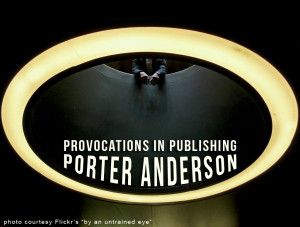Scale: That All the Books Should Be Counted
By Porter Anderson (@Porter_Anderson) | December 20, 2013 |
Caesar Augustus: All Is Forgiven
And it came to pass in those days, that there went out a decree from Caesar Augustus that all the world should be taxed.
Luke 2:1, King James Version, New Testament
That glow on the faces of so many of us Protestant ministers’ children this time of year is a reconnection. Like sticking our fingers into the science-project sockets of our childhoods, we sit around tempting mythology to fry us again, gazing at this verse and that phrase by the self-published (papyrus format) author Luke.
And, lo, the Angel of the Lord came upon them, and the glory of the Lord shone ’round about them: and they were sore afraid.
We read Luke as we still hear him: in the heaving, ancient, world-splitting spectacle of the King James Version of the New Testament. Those wild, even preposterous images thunder again in our heads:
And suddenly there was with the angel a multitude of the heavenly host praising God, and saying, “Glory to God in the highest, and on earth peace, good will toward men.”
Our good colleague, the publishing consultant-prophet Brian O’Leary has reminded me in the Tweeterie this week that, of course, we may well be hearing more from crafty translators than from that busy desert scribbler Luke, himself.
And what would the everlastingly quoted apostle say now if he could see how many times he has been published?
In how many translations?
In how many formats across the millennia?
Right up into our era, you catch the voice of this bestselling Luke, even in the purposely attenuated annunciation of Tony Kushner’s Angels in America:
Greetings Prophet! The great work begins! The Messenger has arrived!
And like the riven skies above devastated shepherds, our modern ceilings collapse in heart-stopping pageantry that, truth be told, has much less to do with religion for many of us than with consummate expressions of scale.
Scale. “Can this scale up?” “How do you scale that idea?” “It’s all in how quickly we can scale it.” “Without a Big Five publisher, you’ll never have that kind of scale.” “These are changes in our business on a scale not seen since Gutenberg.”
Right? We hear such phrases a lot these days.
[pullquote]The radiant mythology that once could slam my boyhood imagination against the wailing wall of a dying faith now makes me get what Augustus needed: scale.[/pullquote]
As I like to remind folks, the digital dynamic—from whence cometh the Great Disruption—is all about scale. It is a crashing, wide-winged engine of distribution. It scales up like a wildfire does, consuming the fuel of our content—good tidings of great joy—and looking for the oxygen of big, big, big audiences of fans who are less, less, less discerning by the day—which shall be to all people. Amazon is digital at a scale now staggering our pre-digital publishers. It bought Goodreads because that platform has more than 20 million members, such scale! You know this story.
So enraptured are we by explosive scale these days—Fear not!—that we now assume we have it where…we don’t.
And once the excitement subsides—as the angels were gone away from them into heaven—I’m left feeling a lot better about Caesar Augustus than I used to. The radiant mythology that once could slam my boyhood imagination against the wailing wall of a dying faith now makes me get what Augustus needed: scale.
That all the world should be taxed. No, not taxed. And this taxing was first made when Cyrenius was governor of Syria. In publishing today, what isn’t taxing?
Augustus was counting. And all went to be taxed, every one into his own city. Can you imagine? Augustus was capable of compelling each male human in Roma’s far-flung empire—all the world—to travel to his home city-state, stand forth, and be counted.
Such a dude, this Augustus, I cannot tell you. That’s scale.
Where is Augustus when we need him now?
New Testament(s)
Some observers say that our industry’s surveys can imply that traditional publishing is the best hope of financial success. The concern is that they might wrongly disparage the potential of other paths, such as self-publishing.
This is irising into manger-tight focus and will factor noisily, I think, in publishing discussions in 2014—this thing which has come to pass—hence my coming to foretell it to you now.
The self-publishing author Hugh Howey—he of the Saga Silo trilogy (Wool, Shift, Dust) and of many new works (Sand, Peace in Amber, the Apocalypse Tripitych)—knows a few Augustan-sized things about scale. He has 30 foreign publishers and just spent two months touring his empire on the Continent, shaking those international hands. Howey has sold more than 2 million books.
He has become concerned that such survey efforts as the “What Authors Want” survey that’s produced by Digital Book World (DBW) and Writer’s Digest (WD) don’t adequately reflect the earning potential of every path to publication. Updates to this survey effort are part of the reports delivered to attendees of the Digital Book World Conference & Expo, which comes up January 13 to 15 in New York (hashtag #DBW14), and iterations of the Writer’s Digest Conference.
This is not a fight. Howey, himself, has gone to the mat to say, expressly, that nobody does this survey work better than DBW.
But this is a crisis of characterization and it affects every author now keeping watch over her and his books by night, traditionally or self-published.
We have no imperial swell like Augustus today who can decree that each author—all the world—shall step forward and state his and her output and earnings.
In fact, Howey has identified a precise flaw in how we survey and then interpret results in these issues. I can give it to you with my evolving bullet points on this story:
- If you’re a traditionally published author, surveys will ask you how much you are making from your books—once you’ve been published.
- If you’re a would-be traditionally published author and have not yet been published (you’re “in the slush pile” waiting for the Angel of the Lord to show your book to the right literary agent), you will not be asked how much you’re making from your books—you are making nothing, you have not yet been published.
- If you’re a self-publishing author (maybe because the Angel of the Lord hasn’t made his move with the agents and you’re sick of waiting), the surveys will ask you how much you’re making from your books—no matter at what level your output is being seen and sold. You are, effectively, still in the slush pile that’s being discounted by the traditional world and by surveys, and yet you are being counted because you published yourself.
- So surveys make self-publishing look like a lot less lucrative path in publishing than traditional. Because your aunt’s lovely memoir of life as a Methodist minister’s daughter—Abiding in the Fields—which she created and self-published for 15 members of the family, is being counted as the badly selling output of a published author who has sold only 15 copies of her magnum opus.
It gets worse.
[pullquote]We don’t have a way to count what’s really happening in self-publishing revenue—we don’t even have a way to count how many self-published titles are out there.[/pullquote]The data we need on all this is not available. Nobody has to cook the books on this because the books are not there to cook.
- We cannot see, let alone survey, all the output of self-publishing because many entrepreneurial authors decline to pay for ISBNs, the universal standard tracking identifier that lets survey-takers monitor the market. ISBNs are pricey. You need six or so to cover each format of a given book. Ten ISBNs will cost a self-publishing author $250. But a publisher can buy 1,000 ISBNs for roughly $1 each. (Maybe we are talking about taxation, Augustus.)
- We cannot see, of course, all the many, many, many books that never came out of the universal slush pile when agents didn’t choose to pick them up.
- And we also cannot see the sales numbers of our great houses of retail—Amazon, Barnes & Noble, et al—because they hold those figures as trade secrets, legally and exasperatingly making it impossible for us to understand the full scope of our own industry.
The custom in survey-making and -reporting is to say something along the lines of: “We have determined that traditionally published authors make this much money; self-publishing authors make a lot less money; and ‘hybrid’ authors (who publish both ways) make the most money” because hybrids have income from both traditional books and their self-published efforts.
Every word of that might be true. But we don’t know it to be true. Because, in fact, we don’t have a way to count what’s really happening in self-publishing revenue—we don’t even have a way to count how many self-published titles are out there.
In 2012, Bowker, the US agency designated by the International ISBN Agency to sell and do the tracking of ISBNs in the States, could spot some 391,000 “self-published ISBNs.” Meaning books. Meaning 391,000 self-published books that did get ISBNs attached to them by their authors. Huge.
But how many more self-published books were invisible to trackers because they didn’t get ISBN’s? That number is thought to be huger still, something that might rival the multitude of the you-know-what in Bethlehem.
An interesting sidelight: We’ve just learned this week from Bowker’s Laura Dawson—a fellow preacher’s kid being battered along with me by the Glory of the Lord shining ’round about her this time of year—that the 2012 figures showed a major jump of 60 percent in self-publishing authors using ISBNs over 2011.
This is heartening to a Judea-crazed journo like me because it makes me think that more self-pubbers are realizing they need to stand and be counted—every one into his own city—so we can actually start getting a handle on just how fabulously massive the scale of self-publishing really is.
All Things Heard and Seen
After Howey wrote an essay, You’re looking at it wrong, to explain this dire flaw in how we survey author earnings, I followed up with my own oratorio in Writing on the Ether: Where Publishing Surveys Cannot Go. (A fine brace of comments follows, if you have time to look.)
Then the author Chuck Wendig came through, as he often does, with a couple of finely distilled observations on why so much emotion can gather ’round these issues for us—this thing which has come to pass—in Writing vs. Publishing (or: “No More Half-Measures, Walter”).
First he states Howey’s concern nicely:
Howey’s right-on with the error on how one calculates income from traditional works (which had to be vetted through various stages) and income from self-published works (which are not whittled down by that vetting process and so represents a far larger bulk of work, roughly equivalent to the slush-piles that fail to dwindle due to the varying kept gates of the system). It’s not that we’re comparing apples to oranges: we’re comparing a bushel of apples here to a truckload of apples there.
And then he gets at the evaluative element this way:
While I totally share Howey’s excitement over the sheer joy and power of creating stories out of nothing, I think his posts…maybe conflate writing and publishing, which has for a long time been one of my overall theoretical problems with not the act of but the culture of self-publishing. (It’s why I prefer the term “author-publisher” because it clearly separates out those two roles, yet keeps them joined by that magical hyphen. A hyphen is like a bridge made out of pure punctuation.)
I love Wendig’s delineation of the act of self-publishing vs. the culture of self-publishing, don’t you?
Like a holy ray of light on the nighttime pastures around Nazareth, it flashes into relief the approach-avoidance so many feel about the whole business.
And when Paul St. John (not the apostle) Mackintosh at TeleRead performed a handy recitative on The Big Reporting Gap in Self-Publishing Income, a commenter named Stephen (not the saint) reminded us all of an annual accounting that Howey’s own agent, Kristin Nelson, has done in the past on a year’s work. Stephen gives us Nelson’s 2010 agency numbers this way:
Queries received and responded to: about 36,000
Sample pages asked for: 829
Full manuscripts asked for: 98
New clients: 9
They ask for sample pages for about 2.3% of queries. They took on a new client about 1% of the time they asked for sample pages.
The slush pile is huge.
Like the man says, the slush pile is huge. Just look at that scale.
I’m hoping that as we consider these figures—they made known abroad the saying which was told them—we can prevail on Nelson to give us her 2013 figures once we’re on the other side of this year’s tour de Bethlehem.
Howey, meanwhile, is in hot pursuit, commenting back.
Stephen: Those are terrifying numbers…I think you could very easily and conservatively put the estimate of slushpile books that go on to get published at .25%. That’s one quarter of one percent. I think is is probably too high, but I would rather err on the side of caution and give traditional publishing all the help I can possibly give it.
Howey now is looking for a formula that might far better approximate than our current models what earnings an author could anticipate from various career approaches.
The easiest comparison of earnings would be to compile the total from traditional publishing and line this up against the top quarter of one percent from self-publishing, and see how those earnings stack up.
He details his workup of the .25 percent calculation in that same comment chain.
And he’s coming into this as an increasingly influential authorial voice in our industry with a humility that my man Augustus probably didn’t worry himself about too much:
I want to see real results so that aspiring writers can make the best decision possible. If that ends up being that authors are better off braving the slush pile and waiting years for a book to come to market and only having that book on store shelves for 3-6 months rather than publish now and publish forever, I will stop evangelizing for self-publishing as hard as I have been.
[pullquote]We have no imperial swell like Augustus today who can decree that each author—all the world—shall step forward and state his and her output and earnings.[/pullquote]
There are more discussions in play now on this issue. We need a handle on the scope of the industry and the scale of self-publishing within it. In coming months, I may come back to you with more on this and ask you to offer your input on further considerations. Unless we can get another decree out of Caesar Augustus, we’re going to have to sort it out, ourselves.
One of Luke’s most marvelous lines, usually considered a throwaway, is this:
All they that heard it wondered at those things which were told them by the shepherds. But Mary kept all these things, and pondered them in her heart.
For now, as seasonal, primal mysteries crowd in on us so deeply, all I ask is that you do a little pondering.
Tell me whether you’ve questioned the scale, the reach, the sheer power of this new author-centric evocation of publishing (both traditional and self-) that’s rising all around us, as Howey is pointing out, so curiously all but unseen. Some authors say they don’t think quantifying their ranks is important. Do you?
Main image iStockphoto: eZeePics Studio

















Porter, you are a piece of work. And, that’s a good thing. Your posts are magisterial, dense, packed with insights and multitudes of obscure references, if Bibical illustrations of contemporary publishing industry norms and deviations may be considered obscure or even relevant. Nonetheless, I hold you in awe. From whence did your mind eminate, a supercharged circus?
Alex,
You and our WU colleagues here are one long-suffering bunch to put up with such Nativity scene-fueled concoctions as these. :) I think ministers’ kids are especially obnoxious this time of year, since the family business considers the content to be its own personal inventory.
Thanks for your kind comments. The Methodist church probably is as close to your “supercharged circus” as any of us would care to get, and for all my ribbing, it actually provided me with an astonishing substrate of organized eloquence — I’m lucky to have had it, and that’s easier to appreciate since I long since escaped it.
All that said, this question of trying to understand the scale of our industry is going to take a widening bit of attention going forward. At some point soon, the business has to stop and stare back at this problem — no villains, just strange circumstances colliding — and together we all have to come up with a way to better understand what’s going on.
I’m sure we’ll get there. Maybe with less preaching from me, too.
Thanks again, sir, you’re faithful backer of serious thoughts about the industry, and I value that highly.
Good holidays!
-p.
My head hurts too much this morning to comment, but wanted to take the opportunity to wish everyone here on WU a wonderful holiday, and a safe and productive 2014.
Merry Christmas, Porter.
Sincerely,
Denise Willson
Author of A Keeper’s Truth
Hey, Denise!
Sorry to hear your head hurts, but thanks much for the good wishes. Happy holidays to you, too!
-p.
I can’t even imagine what little Porter’s Christmas list must have looked like!
(Merry Christmas, Porter! I hope you get that industry! industry! calculator you seem to be hinting at!)
Hey, Dee!
The Merriest Campari-colored Christmas to you, and I’ll be watching for you in the big new year! Cheers and keep the faith. :)
-p.
Regarding Howley’s choice of 6-9 months on the shelf versus publishing now and forever, I only wonder: after the 6-9 on the store shelves, besides hopefully gaining some attention in readers’ favorite place to find new books, are you not still published forever via the same e-shelves those who bypass the stores are nestled upon for all eternity?
I suppose one of my greatest fears is that I end up on the “slushier” end of that eternal shelf. So I really appreciate your sharing of Mary’s pondering in her heart. I think, just for the holidays, I’ll couple that with what McCartney claims as her words of wisdom, and “let it be.”
This is all so very interesting, bro. And just a hoot to read. You are one of WU’s gifts to writers, Porter, so thank you. Wishing you the happiest of holiday seasons.
Hey, Vaughn,
You pretty much have me red-faced with those incredibly kind comments. I’m about the color of my Campari here, so thanks incredibly, although you’re way too nice.
Before I forget, a hitch in the traditional contract in many people’s eyes is that while an ebook’s publication by a publisher will likely outlast a print version on the real-life shelves, it is not, actually, “forever” in the way that it is if an author self-publishes it. Rights are the problem. On that traditional contract, you sign over your rights in such a way that the publisher controls the ebook as he/she controls the print book. And there can be a serious bump at the point the rights are reverted to the author who then must work out how to self-publish it. I’ve looked, for example, at the new covers author Barbara Freethy had made for her many backlist books when putting them out in self-pub for herself. Loads of work there. But at least at that point, the rights then are the author’s and, presumably, will stay that way…lots more “forever” likely when the author holds his or her own rights.
“Let it be” is a pretty helpful line alongside some pondering, yeah. You know the classic gesture seen in many Old World depictions of Mary, her hands drawn apart as if she’d just parted a curtain? That’s the “fiat,” an arts-gestural symbol of the phrase “let it be…let it be done,” in effect the mother of God bowing to the infinite responsibility placed on her and agreeing to accept such a fate, a gestural relative to the classic, “Thy will be done” line. Cool, huh?
I do believe we’ll have more rather superb news on this whole front, actually. Some extremely good people are in touch about the problem we’re having helping authors evaluate their potential courses of action in terms of earnings and pathways. Help may be on the way. (Let THAT be. lol)
Thanks again, Vaughn. You do keep this crowd together in some pretty amazing ways here at WU, one multitude of an Earthly host going off in all directions. You make it look easy.
When the Wise Women get here, may there be gold in your stocking. :)
-p.
Paul McCartney was inspired to write “Let It Be” after he had a dream about his mother, who died from cancer when he was young. In his dream his mother told him, “It will be all right, just let it be.” The song has nothing to do with the mother of Jesus.
Hi, Cal.
As far as I know, you may be completely correct. The song, to the best of my knowledge, MAY have nothing to do with the biblical mother of Jesus of Nazareth. I’m more than happy to accept your note here as gospel truth.
However, I’m having to say “to the best of my knowledge” because — to the horror of many, I know — I am not a big Beatles fan, although I’ve met McCartney to congratulate him on a classical work that was premiered at Carnegie, music much more to my liking than the Fab Four’s output. And so I simply cannot say with any assurance whatever which influences the McCartney song is thought to involve. I’ve never looked this up in reference to the song, and will not be doing so.
Thus, as we love to say in the business of criticism to all who disagree with us: You may be right. :)
My intention in my comment to Vaughn was not to say that the Latin “fiat” line and its sometimes association with the figure of the Virgin Mary has anything to do with the McCartney song. Sorry if I confused you. I was responding to his mention of “let it be” with that tidbit of Vatican-based interest only and I’m perfectly happy for it to stand completely separate from any and all characterizations of the McCartney work.
Thanks for your input. I’m most happy to let it be the way you know it.
-p.
On Twitter: @ Porter_Anderson
I like numbers, even have some favorite ones, and think myself to be extremely fortunate to be in this writing business. It has blended perfectly with family life. As I investigated the probability of being published, I found myself even more thankful for stumbling into it. Deo gratias.
A Merry Christmas and Happy New Year to you Porter, and to all at WU. I discovered it only this year and completely delighted with the offerings.
ps: I also discovered that you’re a native Charlestonian. We are Pacific NW transplants, but never has a place felt more like home.
Hello, Charlestonian Vijaya!
How grand to hear from the Holy City! Such a fine note, thank you!
I’m delighted not only to hear that you’re having such a good experience in your career with the family but also that you’re glad to have found Writer Unboxed. It is an increasingly powerful center of diverse thought and thoughtfulness (on our better days, lol) about life in writing and the evolving publishing ethos. I’m very proud to have found it ranking recently between numbers 1 and 5 on Technorati’s ratings of more than 19,000 books-related sites, astonishing traction…a blessing to all of us, yes, Zeus and his descendants be praised, we give thanks ad Parnassum :)
Now, regarding Charleston. Yes, I’m from James Island (“Jim Island,” locally), born in Roper Hospital. :)
Do you know of the coming PubSmart Conference in Charleston, April 16-18? Very excited about it. It’s designed both for writers and for small publishers, very cool, and will feature Writer Unboxed icon Jane Friedman and Hugh Howey, both doing keynotes (not on the same podium at the same moment, I should assure you, although the scenario offers tantalizingly fun images, lol), and there even are to be some ravings from yours truly in various panel sessions and things — these are brave conference organizers.
The link to the site is here: https://pubsmartcon.com/ And if you use code PS14PA30, there’s a discount at registration. We’ll be holding forth at the “Swamp Fox Hotel,” the Francis Marion on Calhoun, we’d love to have you join us.
Thanks again, great to have you as reader and commenter, all the best for the holidays, eat shrimp for me,
-p.
On Twitter: @ Porter_Anderson
Holy smokes!!! Thanks for the link to the conference venue in my metaphorical backyard Porter. Looks interesting and fun … must check calendar and sell a couple of books. I do a fair bit of WFH to support these habits. I’ll pass the crustaceans to my husband and kids. Thanks again. I hope to see you there.
Porter,
I was brought up Irish-Catholic, so I wasn’t fazed by all the King James hullabaloo you unleashed on us this morning. Irish Catholics, we’re taught early that most words that begin with a P are not Catholic and we are immune to ‘em. These include pagan, protestant, and many other P words. In fact, I’d speculate thousands of words in the English language alone that start with a P and go through every other letter of the alphabet for the second letter, just use your imagination and you’ll get my point.
However, as one kinda immune to pomp and circumstance (we Irish-Catholics are usually jaded to this stuff by extreme exposure to Roman ritual and the Melancholy Celt Melodrama of our lives by the age of six or so), one contemplation from you (the man behind the curtain), stuck out for me, and it was that bit about “dying religion”.
Do you think perhaps that it’s possible that the religion died a slow death and those death throes started a long time ago, only like Howard Dean or whoever it was that said it first, the revolution wasn’t televised?
I’m wondering if perhaps the internet came after the revolution of a brave new common perspective, and the ‘net’s part spread the word of a revolution already accomplished. The ‘net ensures that this time the revolution is here to stay. Because, this time “the word” of revolution has the technology to spread more effectively than any revolution in the entire history of humanity.
The publishing industry as it was, the film industry as it was, the music industry as it was, the world as it was, will never be the same because the revolution has at last become an acknowledged part of human perspective.
Well thanks for opening up my brain this morning. I enjoyed your post, I always enjoy your posts and I’m not sure any of what I wrote now makes sense, but it did as I wrote it.
I just woke up and I think I need a cup of coffee.
Wishing you a wonderful holiday season,
B.
It was Gil Scott-Heron who said the revolution will not be televised. A rapper before rap was all that.
Well said. :)
Bernadette!
Not only are you making terrific sense and how do you do it without coffee? but you also are doing an intriguing thing here.
You know the Juneteenth story, right? The Emancipation Proclamation was made effective by Congress on January 1, 1863. However, there was, um, resistance, as we know, for a long time. And only when Union soldiers arrived at Galveston to force compliance in June of 1865 did Texas capitulate and announce, on June 19, that African Americans were freedmen. The phrase “Juneteenth” was coined for June 19’s announcement.
I bring it up because it’s a kind of parallel to the fascinating idea you’re raising here, that many of our big changes in social history, including religion, have preceded the advent of the Internet, but only through its ubiquity have the realities of those changes actually been “made flesh and dwelt among us,” as some more of our Protestant-pagan palaver (enough p’s) has it.
I think you’re very right, certainly in the case of that “dying faith.” There are many areas of great, robust energy around the great faiths of the Old World today, we should hasten to point out. To be at a Latin American Mass on a Papal visit, for example (you may want to duck that P in Dublin), is to see an astounding reassertion of the fervor we historically associate with ardent adherence to the faith, even though the young people who throng such events may have an understanding of what they’re worshiping that could throw the Curia in Rome into full revolt.
Outside of such brilliant demonstrations of still-vibrant interests, however, yes these several world doctrines, not just the one into which I was born, have been struggling with the new era(s) for a long time. They will be with us still, I think, for a long time to come. Quick exits don’t look likely, no one need hasten to worry.
But as you’re saying, the peculiar ability of the Internet’s world-wrapping gaze to look at these things from such a high view — the focus of so many millions of eyes rather suddenly conjoined on almost any subject we like — has shown us all kinds of weaknesses and sometimes strengths in unexpected places.
Good insight, Bernadette!
Thanks, as ever, for reading and commenting, always great to have you, and bests for the hols!
-p.
-p.
On Twitter: @ Porter_Anderson
Porter, a hundred hosannahs for keeping the Methodist metaphor herd in line here. My hope is that the accurate tracking of trad pubbed, self-pubbed and preternaturally pubbed works continues to be a thorny issue, just so we can delight in your phrasing hijinks.
Jeez, the verbal verve alone of “This is irising into manger-tight focus …” lit my Christmas lights. Keep motoring, Porter, and happy holidays!
Wow, did I write that “manger-tight” line? See, Tom, the Campari has already kicked in. :)
Thanks for your kind words, and don’t worry, seems to me that many more travails will continue to dog the industry! the industry! and thus keep me writing intensely irritating copy about it. Careful what you wish for. :)
Thanks for all your support, seriously, and have great hols, yourself!
-p.
On Twitter: @ Porter_Anderson
Porter,
You appear to view the Bible as mythological fiction. Others, as you may be aware, view the Bible as historical non-fiction, while still others actually view it as the literal and infallible word of God. Any enlightened person should agree that we are all entitled to our own personal views, whether anyone else agrees with them or not. My hope during this holiday season is that someday we can all express our views, whatever they may be, without fear of persecution from our peers.
Hi again, Cal.
I do indeed consider the Bible to be a collection of mythological fiction, yes. Exactly. Some of it is quite beautiful. Edith Hamilton must have been quite envious.
Because I think you feel that this means I in some way want to insult people who think of it as the actual word of a deity or as historical material, etc., I just want to assure you that there is no such insult here, nor the intention of such.
People of all faiths have every right to pursue and observe their beliefs as they see fit.
People of all faiths also have the responsibility to understand that others will see their beliefs differently — and that the expression of other views about their faiths is not persecution but precisely the kind of open speech in which you seem to be so rightly interested.
I’ve always enjoyed a line that I first encountered in the work of Robert Heinlein but that I’ve come to believe had been around in various forms before he used it: One man’s religion is the next man’s belly laugh. :)
You are most welcome, Cal, to laugh heartily at anything you perceive to be a religious belief of mine. Go for it.
And I shall continue to chuckle at will.
All the best,
-p.
On Twitter: @ Porter_Anderson
For the record, I am not expressing a view on religion in my comment to your post. I am agnostic in my view of religion. I am pointing out that, when you casually dismiss a spiritual belief that hundreds of millions of people throughout modern human history have based their entire view of the world on, as mere mythology that deserves the ridicule your humorous tone suggests, you are in fact, whether you intend it or not, insulting and offending a very large number of people.
Hey, Cal.
Thanks for your clarification, good to know.
I’ll simply (and very genially) disagree with you on your larger point.
I was fortunate to grow up in the home of a devout and deeply dedicated minister and missionary (on the Korean field) whose greatest lesson for me about our most fervent beliefs was that humor is the one true sign of genuine faith. Daddy had a marvelous, aggressive, eager sense of humor, not only about other faiths but most especially about his own. Many were able to approach the churches in which he served (in the South Carolina Methodist Conference) precisely because they found a true believer leading them who loved nothing more than to suddenly take down this or that preposterous bit of scripture or concept (some things just don’t travel well over 2,000 years) and without losing a shred of respect for the intention of that scripture or concept.
I’ll give you an example. We drove by a huge Baptist church in Greenville, SC, at Christmastime once in the family car. Mother pointed out that the Baptist church had beautiful holly wrapped around the railings of the big stairway leading up to the church’s vestibule. “But if somebody trips and grabs the rail,” she said, “they’re going to hurt their hands on all that holly with those thorns.”
Daddy didn’t miss a beat: “Jean, that’s what the Baptists call suffering for Jesus.”
Over the years, I’ve found, in fact, that the only folks who can’t handle humor in relation to their faiths are the most fearful, the most insecure, the most pained. Their defensiveness silences their laughter. And I learned from Daddy that it’s the smile that finally consoles and relaxes and reassures and, in fact, ministers to them with the grace of something many people call God, a spirit so sure of its generosity that it can laugh at itself. This is what we really mean by “holy.”
While I could never have chosen my dad’s line of work — and he was incredibly supportive of my need to go in a different direction — I always feel that when I can use my extensive knowledge of the liturgy and life of the church to replicate even a small part of his magnificent sense of humor, I’m in some tiny way, “being about my father’s business.”
And at that moment, the closest thing I know to a “Christian miracle” occurs — I realize that we don’t have to believe to minister to others. Isn’t that a remarkable thing?
If the God of Abraham exists, my friend, he created our sense of humor on the very best day of his holy labors.
All the best, Cal.
-p.
On Twitter: @ Porter_Anderson
Well said, Porter. I’d like to buy you a beer some day, so we can continue this conversation. All the best to you, too!
Excellent post, Porter. I’m late in commenting, as the season has scattered both me and my brain, but this is such an important topic, and I appreciate your effort to bring the pieces into focus.
I’m a hybrid author these days, and it really is a crazy balancing act. I’ve been published for 25 years traditionally and been published well…sometimes. Not so well others. My backlist has taken on powerful, exuberant new life in my hands, and that has driven me to want to experiment with some frontlist. Hugh and others are right: once you begin to understand what control feels like, it’s hard to give it up again, win or lose. At least if I lose, it’s my game.
And yet, I still love the cachet of being published and chosen by New York. I still love the delight of getting a poster from my Polish publisher with all my books on it. I still love the pleasure of of the traditional path, the reviews, the ADVANCES. I have a superior editor and agent in New York and it took me a long time to find that team, so I am not going to give them up any time soon.
What I, and many of my indie publishing compatriots have been talking about since that survey appeared is: who did they survey? I am admittedly associating with a fairly high level of indie published authors, many of whom left traditional publishing for indie, and found enormous success doing so. They are not the norm. (I also associate, just by virtue of being in the business for such a long time, with traditionally published writers who’ve landed on lists and made huge money through timing and luck and showing up over and over and over until Magic could happen). The numbers are quite skewed…and until that particular angle is rectified, aspiring and mid list authors can’t possibly make good choices.
Which is what you said. Just weighing in. Thanks for the column.
Boy, Barbara,
What a beautiful statement of PRECISELY the problem that Hugh Howey is helping us all to address head-on. Thank you for this (especially amid the holiday hysteria!), it means a great deal that you’ve dropped everything to add your voice here.
I cannot say warmly enough that the more folks who take the time as you have done here to lay out your experience and characterize these challenges so clearly, the better we’re all going to get a handle on, as you say, just how skewed these numbers have been.
What’s more, you and Howey and some of our other leading authors who are so keenly aware of these issues in this upended industry are among the best situated to guide us on these matters — to actually see where the figures are potentially dangerous because they can so badly mislead fine, talented, industrious writers into thinking the wrong things about various options.
By the way, I understand completely what you mean about wanting to continue with the most affirming, rewarding elements of the traditional career. I can’t think of anybody in his right mind who would suggest giving over those things and it’s actually really good to hear someone as well placed as you saying this. All too frequently, we don’t hear accomplished authors saying, “Look, there are things I love so much in the traditional career that I wouldn’t give them up.” That’s an incredibly important perspective that we’re not hearing articulated well. (For that matter, I’ve written many times that the publishers, themselves, seem almost paranoid about getting into the mix and talking about what they do well. I wish more of them felt they could do so.) The ADVANCES! Yeah! You, me, and Augustus, too, all in lock step there. :)
I can completely understand the “who did they survey?” question, I’ve heard it asked by many career authors.
As I understand it, the “What Authors Want” survey is publicized by Writer’s Digest (which co-produces it with its sister vertical at F+W Media, Digital Book World). My assumption, then, is that a large number of its respondents are readers and subscribers to the magazine, probably attendees at Writer’s Digest Conferences, and so on. Many of us journalists are asked to mention it to our readerships and constituencies to help be sure a large sample of responses is collected. I’m always happy to do this — like Hugh, I support the effort WD and DBW are making, I just feel that we need, first, some very serious and constantly displayed warnings about the results, and then, of course, we desperately need to devise some other, better ways to start quantifying what’s happening for folks.
The trip-up in the “come fill out our survey” methodology, of course, is that this is a “self-selecting” sample, as researchers put it: volunteers. Bless them for volunteering, but the more scientifically edifying approach is always rigorous testing, screening and selection by professional survey administrators — the approach well known in the work of Gallup, for example, Pew, Bowker, Nielsen, PriceWaterhouseCoopers, and so on.
In a comment on one of my posts about this, I compared it to the recent national library survey that drew such glowing comments about libraries. The sample comprised folks who saw posters (“Fill out our survey!”) while at the library and such. And so, of course, these well-intentioned respondents could hardly be called an unbiased pool of opinion about the value of these great institutions in our communities. For the most part, all of us reporting the thing had to effectively dismiss it as unusable input, which is a shame.
What we may be looking at here, in the final analysis, is a need for (1) some innovative survey models to approach the problem of drastically inadequate data in some areas, and (2) extremely controlled, fully unbiased scientific sample selection — survey work done, in other words, to a sharply demanding level of criterion at every point. In such a scenario, for example, I could see you and the writers you’re in touch with as part of an initial selection pool from which vetted participants would be drawn because you HAVE been through the entire range of experience and can produce actual, tangible numbers and appraisals of how things have gone when different variables were applied. Finally, (3) any result put forward has to be fully disclaimed for any shortcomings and potential misunderstandings it may carry.
If I may, I might call on you from time to time — as I mentioned here, there are conversations going on, not least thanks to Hugh Howey seizing the issue, which I hope may lead us to some better things.
Meanwhile, thanks again for jumping in here. So much experience and wisdom is in your one line, “At least if I lose, it’s my game” — that, alone, is worth the read of your good comment as you explain the pros and cons of what you’re finding in new ways of managing back- and frontlist issues. Tremendous.
Thanks again and all the best for the holidays!
-p.
On Twitter: @ Porter_Anderson
Hi Porter – Loved your blog as always and so glad you’ve taken up this topic of surveys and scale. I wasn’t surveyed and I’ve sold close to 4 million ebooks through self publishing in the last 3 years and I don’t know any top selling Indie authors who were surveyed so I wonder how valuable a survey is that doesn’t include all parts of the scale.
I think the publishing industry likes to present itself with surveys that back up traditional publishing. I have no problem with people who choose to publish traditionally, I just have a problem with authors not getting all the information they need to make an informed decision. There are going to be millionaires in traditional and self publishing and also people who make nothing in traditional and self publishing. Publishing has always been a speculative business and not for the faint of heart. But I think some Industry mags and Big 6 publishers are demonstrating a willful ignorance of what’s really going on in self publishing. If you don’t understand what authors can get on their own, how can you ever understand what authors really want?
Hey, Barbara!
Thank you for jumping in! Look how well your comments echo those of Barbara O’Neal, who also wasn’t surveyed, and asks — as you do — who really WAS surveyed for this and why does it seem that the very major sellers weren’t included?
Your point is so well made: When it appears that such an important sector of publishing authors is being bypassed, it only adds to the idea held by so many that we are indeed witnessing, as you say, “a willful ignorance of what’s really going on in self-publishing.”
I love this line:
“If you don’t understand what authors can get on their own, how can you ever understand what authors really want?”
I do see a lot of folks on the establishment side who seem to think they understand self-publishing better than they do. On the other hand, of course, there are many, many self-publishing folks who don’t have as good a handle on traditional publishing as you do because they haven’t had your extensive experience in that part of the industry.
This, of course, is why it’s so important for such surveys to accurately and thoroughly lay out what the options are, so that writers can make really responsible decisions, assessing the scene on as balanced and detailed an understanding as possible.
When a lack of complete data and survey samples that somehow miss key elements of the author population come together to yield results that can confuse or mislead authors, it’s a time for aggressive disclaimers — and for a reconsideration of these exercises and ideas on what can be done to improve them.
Many thanks for being part of that reconsideration and for spending the time to bring your voice to the discussion. We’re going to need to keep the heat on this topic, and I’ll be in touch with you about some more elements of the debate as they develop. Your input can be nothing but helpful going forward.
Meanwhile, I’m delighted to know you’re approaching the 4-million-ebook mark! I’d been noting to folks that you were past the 3-million mark and now can update that number with pleasure. What an incredible accomplishment.
Congratulations, and thanks again!
-p.
On Twitter: @ Porter_Anderson